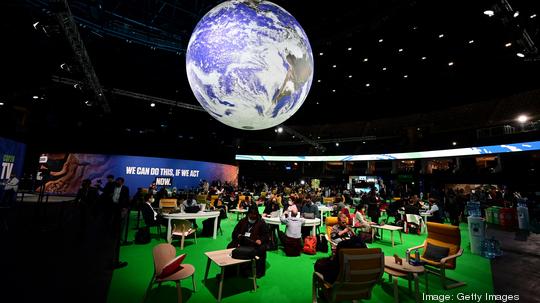
The COP26 climate conference has evoked an odd mix of grim reality and climate optimism from its attendees, including Boston leaders who made the trek to Scotland to participate and observe.
“It’s been inspiring, productive and alarming,” said Somerville mayor Joe Curtatone in an interview from Glasgow.
The soon-to-be head of the Northeast Clean Energy Council, which aims to help clean energy companies innovate, said he has sensed purpose and energy at the conference.
But there was also an urgency that borders on desperate.
“I don’t want to be at COP42 and saying the same things as here. I would say I’m not pessimistic,” Curtatone said. “You need to be deliberately optimistic. But … it was alarming. The impacts of the climate crisis are cumulative.”
The event’s attendees heard from leaders of the South Pacific island nation Tuvalu. Standing knee-deep in water, foreign minister Simon Kofe said "we are sinking." Kofe's speech offered a “human narrative” that Curtatone said is vital for the conversation around climate.
“It can’t just be a discussion about innovation and policy,” he said. “We, as nations, industries, innovators, organizations, leaders, we have not made the case. We have not delivered the right narrative.”
The event has been full of symbolism, not all of which was flattering. A Washington Post reporter noticed the name of one of the event venues was the “Climate Pledge Theatre,” alluding to criticisms that the event and others like it amount to political theater. "At least they're being honest?" the reporter tweeted.
Tara Gareau, an associate professor of environmental studies at Boston College, saw another bad omen early on.
“The first couple days, waiting to get in, there was this big COP banner outside on this huge steel structure,” she said in an interview. “The wind’s blowing and howling outside, and the banner popped off one of the rivets on the top right side. It was flopping in the wind. And you just thought, ‘this is a sign of what’s to come.’”
She also described a “great big scavenger hunt of trying to find events” and hoops to jump through for Covid testing and lodging.
Still, Gareau, part of a BC delegation attending the conference, said she came away feeling “very optimistic.”
The agroecologist said that she’s seen nature-based solutions and “nature positivity” take an important place in discussions at the conference.
“It’s been a real joy to be here as an ecologist and to have all of these sessions on nature-based solutions and also seeing the financial sector put money behind that. One of the largest declarations, with hundreds of countries signing on, has been on forest and land use. It’s basically ending and reversing deforestation by 2030,” Gareau said.
“I’m cautiously optimistic,” she added. “That’s how I feel right now. It’s great to see that the United States is back. My goodness, that feels wonderful. To hear so many people be able to speak about climate change and understand how it affects different sectors, and have really good ideas about what we need to do to move forward.”
For Boston and Massachusetts, one of the takeaways was “step it up,” said architect Mike Davis, president of the Boston firm Bergmeyer, who was at the conference representing the American Institute of Architects.
“At one time, Boston and Massachusetts were at the forefront of progressive public policy on building energy use and sustainable design. The rest of the USA is catching up, and some states and cities have passed us,” Bergmeyer said from Glasgow.
“I think the leaders in Boston’s real estate community can be confident now that exceeding an energy use code or incorporating resilience measures in design or doing a life cycle cost analysis or even doing a development carbon budget is not risky anymore, it’s timely and smart. And state and municipal policy-makers can feel confident that the real estate market is ready to move towards a zero carbon economy, and regulate accordingly,” he said.
AIA is attending the climate conference for the first time as observers, and working to advocate policy that helps get buildings to net-zero carbon emissions.
“At COP26 so far, we are very encouraged to see how many people are now discussing buildings and the growing understanding of the role that buildings and building energy efficiency can play in both climate change mitigation and adaptation,” Davis said.
Boston and Massachusetts in general had a strong presence at the summit, from a “Resilience Hub” pavilion designed by Cambridge architecture firm CambridgeSeven, to a rousing speech by Sen. Ed Markey, who called on the U.S. to take responsibility for its climate emissions and said the definition of refugee should include those fleeing climate change.






